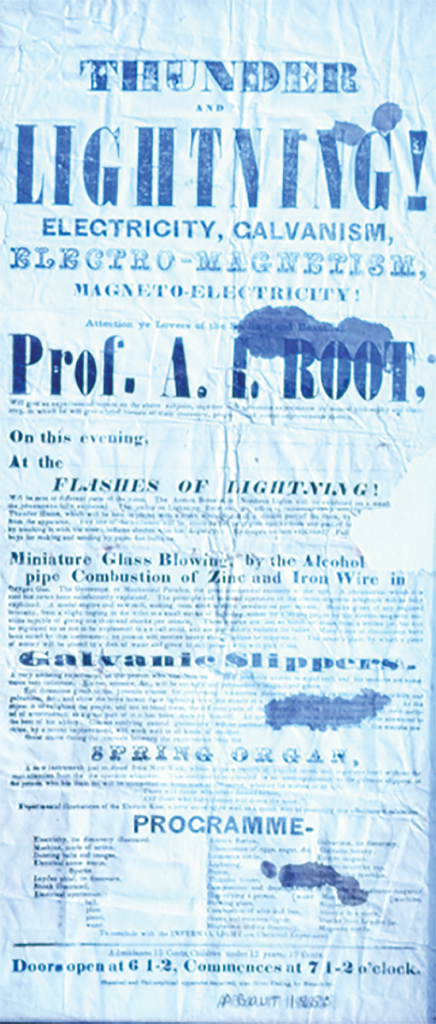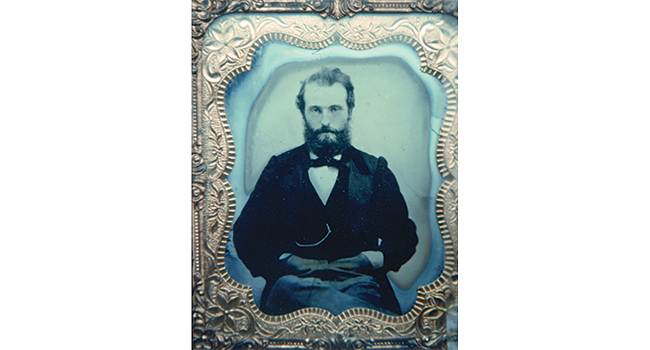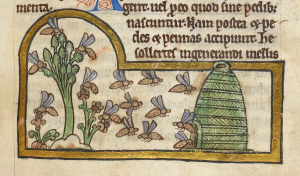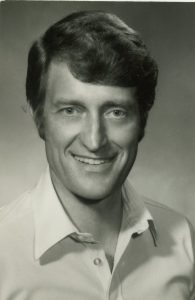By: Ernesst Root
Suggested by the last days and religious characteristics of his remarkable father.
A.I. Root was born near Medina, Ohio, Dec. 9, 1839. He rested from his labors April 30, 1923. The funeral, which was held in Medina May 2, was not a funeral in the ordinary sense of the word. Everyone who spoke seemed to feel that A.I. Root was not dead but that his “soul was marching on.” Not a tear was shed while the eulogies by the prominent men were being pronounced. So far from being a time for sorrow it was a time of rejoicing over his triumphal entry into the new life that would go on forever.
After the Y.M.C.A. quartette sang one of Mr. Root’s favorite hymns, “From Sinking Sands He Lifted Me,” Dr. Drew, his pastor, read some appropriate scriptures and then told of Mr. Root’s love for home church. Dr. H.S. Fritsch, a former pastor, spoke of the help and inspiration he had received from his departed friend; of how A.I. Root’s “amens” during the sermon used to cheer him; of how, if he did not get these, he felt that there was something seriously wrong with the sermon.
Dr. Howard H. Russell of Washington, D.C., founder of the Anti-Saloon League, told how as a student at Oberlin College, encouraged by his classmate Ernest, he had come to see A.I. Root; of how the latter, with Mr. Metcalf, favored the League in its struggles for existence for the first two years; of how, for years afterword, his prayers and his money had helped to make the League the great power that it now is.
The Y.M.C.A. secretary, Mr. Barnes, then sang “I Shall See Him Face to Face.” It seemed as if A.I. Root’s hope of years as expressed in the hymn was at that very moment being fulfilled.
J.A. White, superintendent of the Ohio Anti-Saloon League, the man who had put Ohio across with 189,000 majority against light wines and beer at the last election, told, as had the others, of how he had been helped by A.I. Root’s personality and prayers.
Ex-Congressman Judge A.R. Webber, a lifelong friend and admirer of A.I. Root, called attention to the fact that A.I. Root still lives in spirit and influence. The papers said John Brown is dead; but in the language of the immoral song, “his soul is marching on.”
The last speaker was the Rev. Mahlon Woolf, who said he had been led to Christ and into the ministry largely through A.I. Root’s influence; and then brought out the point that his old friend was a personal soul-winner; that he somehow found it easy and convenient with a new-found friend to open the way to Christ.
Thus closed a funeral that was impressive but not sad.
Early Days Before His Conversion
Writing of his conversion I shall tell of the steps that led up to it, for it was not a sudden entrance into the kingdom, but a growth. I am recording these facts so others who are not “finished products” may see the process by which God sometimes uses some of his children who are not perfect.
A.I. Root was a frail child. As a man he was never strong, often ailing, and particularly sensitive to a cold. Naturally with an active mind that pushed his frail body beyond the limits of his strength, he was of a nervous temperament. If in the early days, things did not move as fast as he thought they should (and there was not one person in ten who could keep up with his fast pace), some one was likely to be pushed along in an unceremonious way. With a voluminous correspondence that demanded his personal attention, a bee journal, and a factory of employees, it is not surprising that he became nervous. He undertook a work clearly beyond his strength. His impetuous nature caused him to step on the toes and heels of his associates because they could not move fast enough.
 When A.I. Root was 18 he went on a lecture tour in which he actually paid his own way without calling on his father for a dollar. With a full beard at 18 he passed muster for a much older man, styling himself “Prof. A.I. Root.” In later years he took no pleasure in this “handle” to his name. After his lecture tour, when he came back to the old farm he became interested in repairing clocks and watches. He took a course in watch-repairing, and at the age of 21 started a watch-repairing shop under the pretentious name of A.I. Root & Co. It is needless to say that he was the whole thing, “company” and all.
When A.I. Root was 18 he went on a lecture tour in which he actually paid his own way without calling on his father for a dollar. With a full beard at 18 he passed muster for a much older man, styling himself “Prof. A.I. Root.” In later years he took no pleasure in this “handle” to his name. After his lecture tour, when he came back to the old farm he became interested in repairing clocks and watches. He took a course in watch-repairing, and at the age of 21 started a watch-repairing shop under the pretentious name of A.I. Root & Co. It is needless to say that he was the whole thing, “company” and all.
He read everything he could get hold of in each one of these lines of activity, and talked with every one who could give him any information. When he got to riding other hobbies such as beekeeping, gardening, windmills and publishing a bee journal, he showed the same intensity of spirit that enabled him to master everything he undertook, and the strangest part of it was that he made all of these hobbies pay dividends not only in experience but in actual money.
His lecture tour, the first of his independent enterprises, paved the way and gave him experience with the world and mankind in particular that was invaluable. His watch-repairing business paid; his jewelry-manufacturing business paid; his bee business paid; his gardening paid. Carrying on all these lines of work, his mind was constantly reaching out to new fields of activity.
As a child, when he was frail and slender, he contracted lung fever, or what is now called pneumonia. The neighbors said that, had it not been for his good mother, he would have died in his early attack, and the world would have lost not only a genius but a benefactor.
His Thorn in the Flesh
A.I. Root in the early days was, as stated, a nervous and sickly child. He had a quick temper; when things did not go right he would fly into a passion. He grew up to manhood, drifted away to some extent from the church and Sunday school of his mother, and into skepticism and doubt. While he was thus drifting, his mother and his wife were praying for him. I remember how on Sunday he and I would walk down to the farm, two miles away, to talk with his dear old sainted mother. I well remember, as we walked back, how he pondered on his mother’s words, and how careful he was not to fill me up with notions of skepticism.
During all this time he was building up a jewelry business till he was melting 200 silver dollars in a day for his “raw material.” The cares of business were becoming heavier; his work began to multiply; there was a struggle in his nature between the skepticism of Ingersoll and Tom Paine and the religion of the Lord Jesus Christ as taught him by his mother. His occasional outbreaks of temper made him fear that he would have to change his mode of thinking and his habits of life. After one of his outbreaks, seriously fearing that the uncurbed habit would lead to something serious, he concluded, after a talk with his mother, that the only way to cure it was by giving himself unreservedly to the Lord Jesus Christ.
In some respects his conversion was like that of Paul’s, with this difference: that there was no miraculous manifestation of any sort. It was a complete turnover from the old life to the new. The change was so sudden that his friends remarked it. A.I. Root did not hesitate to tell the world that he had found a new way. With all the intensity of his make-up, with that bubbling enthusiasm that manifested itself throughout his life, he seemed eager to have the world share with him his new-found Lord.
I remember the first morning after the change had taken place; he seemed to feel that to become a Christian meant a complete turnover then and there. He was going to do the things that a Christian was supposed to do. I remember the first time he said grace, of how in a halting voice, he asked God’s forgiveness and help, how he asked that the old doubts should be dispelled and particularly how he asked that God might help him to live as a Christian every day of his life.
It was noised around the country that A.I. Root had become a Christian, and he was asked to speak at a number of the churches, an opportunity that he readily accepted. And then when his old-time friends of the Tom Paine and Bob Ingersoll persuasion joked him a little, he would come back with that simple faith of his and tell them that he had found something that was infinitely better, that satisfied as nothing else ever did.
Almost immediately after his conversion, A.I. Root took up Sunday-school work. He had a class of boys that had become so unruly that nobody apparently could do anything with them. Some of those same boys today are professing Christians, and one of them was for 10 years a missionary in China, the boy who said he was the “hardest” one of the whole lot to control.
But taking up ordinary church work was not enough. A.I. Root went out into the byways and hedges and established Sunday schools. One of those schools in particular became such a power for good that it put a near-by saloon practically out of business. The proprietor told him that if he didn’t quit that Sunday school some dire things would happen to him, but A.I. Root went on just the same. And the saloon closed.
A little later Mr. Root had a Sunday morning Sunday school before church, made up of employees, and still later he had what he called his “noonday services” in the main office. Every day the employees at 10 minutes before 12 would assemble. One of the gospel hymns would be sung, there was a reading of scripture, a talk and then finally a prayer by A.I. Root. Some people called them “noonday prayer meetings.” Call them what you like, they enabled A.I. Root in the early days to harmonize all difference that might exist between him and his employees.
But he found he could not break that temper in a day. For some time after he became a Christian that same old thorn in the flesh would trouble him. Even after he sold out his jewelry business and went into the manufacture of beekeeper’s supplies and publishing a bee journal, he had a constant struggle with that temper that was the direct result of overwork and of having too many irons in the fire at one time. During this time, from 1875 to 1883, he went through some financial difficulties that would have killed most men; but that irrepressible spirit of his to conquer self, sin and the world could not be downed. His biggest fight was with himself.
On one occasion he had written a Home paper on the text, “Great peace have they that love thy law, and nothing shall offend them.” The next day everything seemed to go wrong. He was irritable; and when one of his clerks quoted the text because his mood showed anything but “peace,” he humbly begged the pardon of all of them. They knew that, with his weak body, he was doing the work of vigorous men.
It was not until the period between 1890 and 1895 that he began to let go of his business. Then it was that his impetuous nature began to soften down until he was at peace with all the world, and nothing could offend him. But this did not come until after a long, long struggle.
Most men, had they gone through what A.I. Root did with his weak and overworked body, doing the work of five men, would possibly have cursed God and man, and given up the fight. It is remarkable that, through all of those strenuous days, he should have been even as calm as he was.
He was so broken in health that it became necessary for him to take long rests, spending the Winters in Florida and his Summers in Michigan, throwing the responsibility of handling the business over on his sons and sons-in-law. He made a trip to California in 1891. It was during these rest-periods that he regained his health and with it that quiet spirit that dominated his later life.
Lived in Attitude of Prayer
In his later years A.I. Root was almost constantly in the attitude of prayer. He spoke often of “God’s gifts.” If he found a new plant or shrub it was “God’s gift.” Frequently through his waking hours he would say, when anything pleased him, “Praise the Lord!” It was spontaneous. He was so full of love of God that he said “Praise the Lord” anywhere and at any time. If a nice shower came he would say, “Thank the Lord.” When the sun shone it was “Thank the Lord.” When I met him at the Cleveland Union depot on his last trip from Florida he called out in his delight, “Praise the Lord!” and when I took him down to the lunch counter for some hot milk and milk toast he said, “Praise the Lord!” The waiters smiled at this little old man, and wondered. It was in this way in public places he would unconsciously start people to thinking seriously about God.
He had another little prayer, just as spontaneous – “Lord, help!” It was his favorite prayer when he needed something, and which lifted his burden from him. He used it in the big and little things of life. When he and I were motoring down to Florida two years ago last fall we got stuck in the Georgia mud, he uttered the little prayer, “Lord help!” not once but several times: I thought I needed men and mules. We were badly stuck, with the rear wheels sunk below the hubs. I went after a span of mules and some men. It took four mules and eight men to get us out. As soon as we got on hard ground father said, “Thank the Lord!” I was covered with mud. The mules had broken the door and smashed the guard of a new machine, and as I was in anything but a prayerful mood, I said “It was the four mules and the eight men that got us out – not the Lord.”
“Yes,” persisted father, “but the Lord helped you to find the men and teams so quickly. We ought to praise Him that the machine is no worse than it is, and that we can now go on.”
And so it was with father, “Praise the Lord.” That little prayer, “Lord help!” was indeed a great help to him, and the Lord did help in ways that seemed almost uncanny as his autobiography will show.
A.I. Root’s Last Days
When A.I. Root wrote the Home paper for May he said to his daughter, at the time, that this might be his last one, and that he thought he had finished his lifework. When I brought him home from Cleveland on his return from Florida I could not help thinking the conversation between the disciples in that walk to Emmaus when they said, after the disappearance of the Master, “Did not our hearts burn within us while he talked with us by the way?” and so I, too, thought as we rode. As I look back, I see that father was telling me, not directly but indirectly, that he was going soon, notwithstanding that he expressed himself as feeling remarkably well. He spoke of the Lord Jesus Christ; of his hope concerning the hereafter; of meeting mother, or “Sue,” as he always called her, and of his abiding faith in prayer.
As he talked I took him back by the long way, for I was enchanted by his words. I was impressed by the feeling that, if there was ever a man in these later days who walked close with God, who knew God and who loved God, that dear old father of mine, whom you know as A.I. Root, was one of them. His words were those of benediction, of love, and of affection; and my brother Huber, after an hour’s talk with him the day before he was taken sick, was impressed with the same thought – the love of God. God seemed to reveal to him almost the day when he would give up life’s work.
A.I. Root’s Last Hours
He seemed to be in good health Friday, the 20th. On the 21st he was taken with a slight cold. He had often had these ailments, and so we thought little of it. On the following Sunday my sister, Mrs. Calvert, was a little concerned as father became worse. As the days went by we called a special nurse. I told father the time had come when we wanted to give him the best care – that we thought a trained nurse would be necessary. We thought he would object; but he said, “Just as you say.” After she arrived he said, “Praise the Lord! Indeed you have given me a good nurse; and the best part of it all is, she is a lover of the Lord Jesus Christ.”
Let me digress right here a little. One of the prominent characteristics of A.I. Root was the tactful and beautiful way in which he would find out from a newfound acquaintance whether he was a Christian. Some people, with the best of intentions, will give offense, but never A.I. Root. If a certain one should say he was not a Christian he would enter a very gentle plea; and the result has been traced in numerous cases when these same people remembered A.I. Root’s words, and later would give their hearts to God.
In the same beautiful way father had a happy faculty of rebuking boys when they used profane language; but in doing so there was nothing that could give offense. A gentle smile and a kindly look from the eyes of that man of God would somehow grip everyone who came in contact with him. But to return.
On Sunday he seemed a great deal better. I took care of him while the nurse was resting. Suddenly, he roused up, turned to me and, looking straight into my eyes said with a bright look, “Is this Ernest, my first-born?” He often addressed me thus.
When I assured him he said, “Thank the Lord.” He then paused a moment, and in a somewhat feeble voice said, “Praise the Lord. He has delivered me from” – I could not make out what he said; but I thought he said it was “from death.” I now think he meant the fear of death. A little later he was resting quietly, and I went home with the belief that the crisis had passed. But about three o’clock on the morning of April 30 the nurse saw that he was getting weaker and sent word to all of us; but before we could get to his bedside his spirit had gone to its eternal rest. He died quietly, just as though he had fallen asleep.
I can not close without quoting an editorial from the Medina County Gazette, By W.B. Baldwin:
Amos I. Root
Amos I. Root was one of the most remarkable men of the past two generations, remarkable not in one way, but in many ways. His was a many-sided character, if any man ever had one. Inventor, writer, manufacturer, publisher, thinker, philanthropist, reformer, moralist, agriculturist, Christian. In all of these his character was marked and he was a leader. In most of them he loomed large. Even as an agriculturist, he tilled the soil in a modest way, yet as in everything else he excelled in this, for he not only made two blades of grass grow where only one grew before, but he was gifted with the ability to make things grow where they had never grown before. In many ways his reputation was world-wide.
But what was best about him and his works and his life was that whatever he put his hand or his mind to, it was with the idea of benefiting humanity. And it can be truly said of him that the world was better for his having lived in it. He did not live for himself alone – or he would not have lived as he did –but unselfishly and whole-heartedly he lived for others, for his family, for his friends, for his employees, for his neighbors, his fellow townsmen, for humanity. And he did much to make them all better and happier.
But if there was one characteristic that stood out above all others, it was his absolute sincerity in everything that he did or undertook. No amount of scoffing or ridicule – and he endured it many times – could swerve him from his belief or purpose and he went straight to his work without faltering or swerving from the path he had chosen. Nor was he above admitting it when he found out he was wrong or in error.
Although he retired many years ago, from active management of the business that he founded and made a success, he did not retire from an active life; but he continued to move among us, brain and hands always active, easily the leading citizen of the community, as he was the most widely known – for his works and name went to the uttermost parts of the earth – but he is mourned not so much as a public personage, but as a gentle, lovable, God-fearing, man-loving, charitable character. Though dead, his influence will go on and on. The prayers of a grateful and loving community follow him to the better world.







